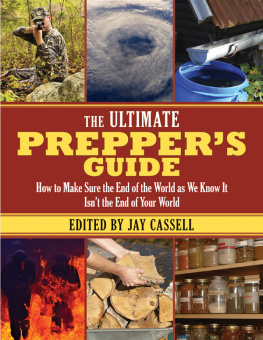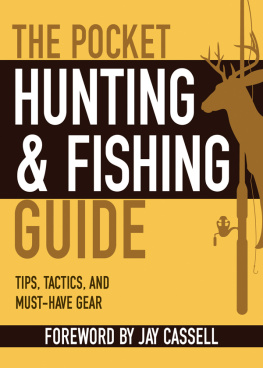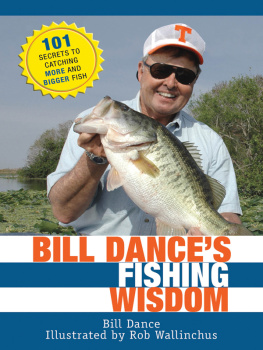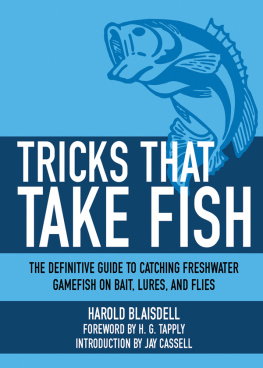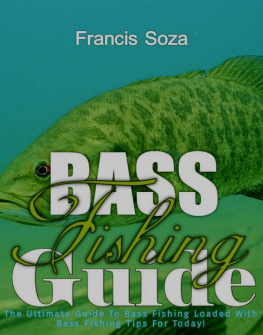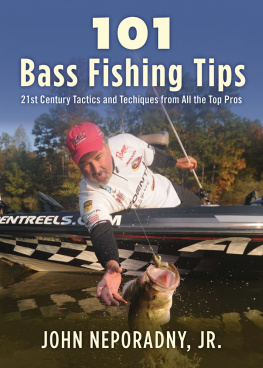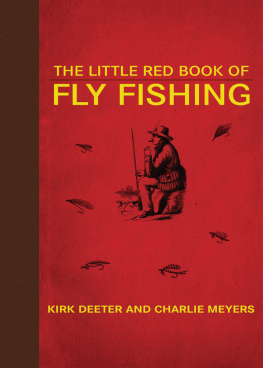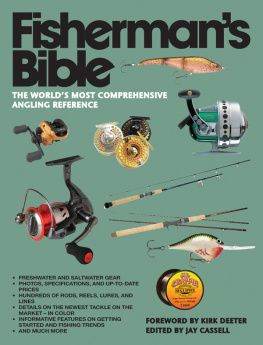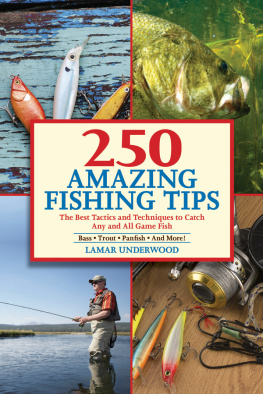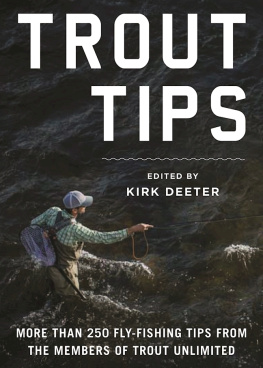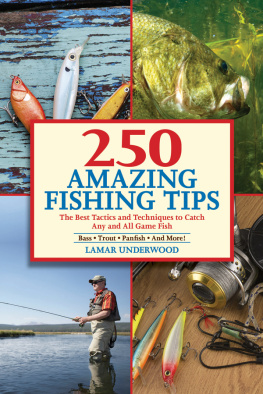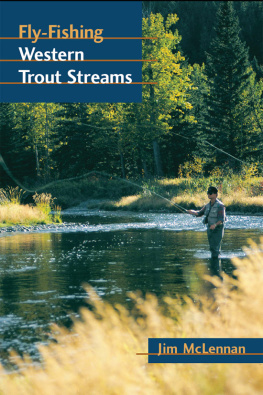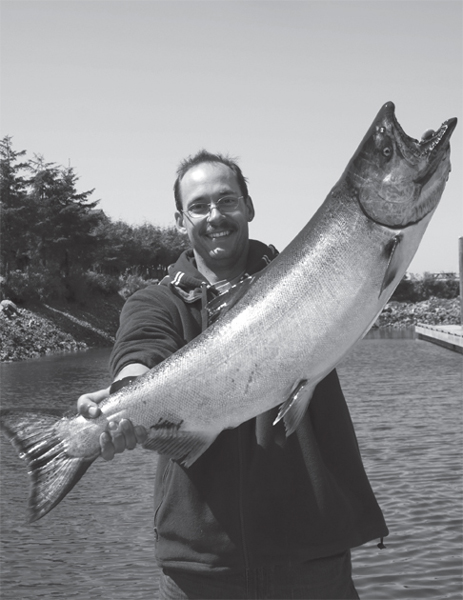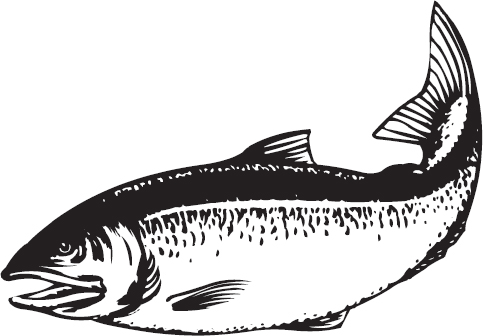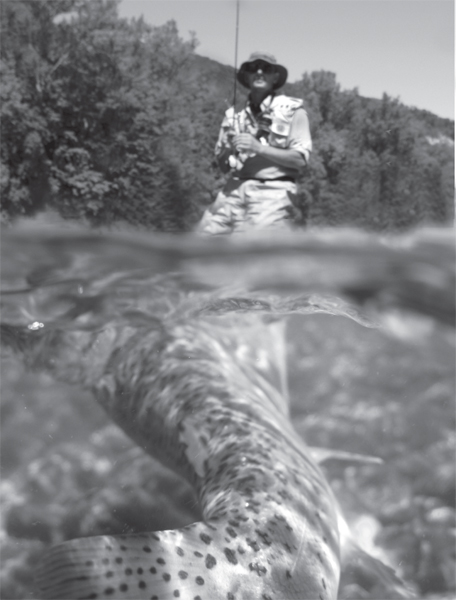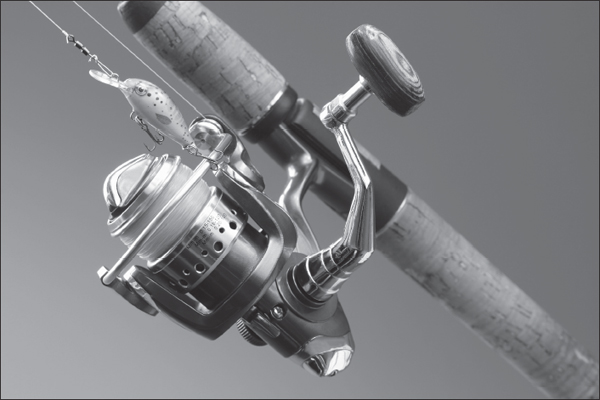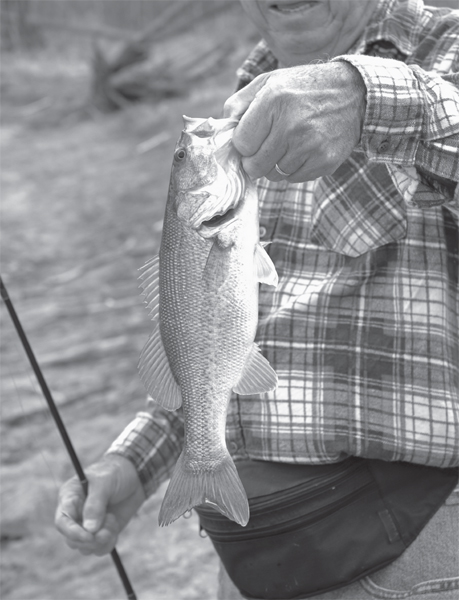Copyright 2012 by Jay Cassell
All Rights Reserved. No part of this book may be reproduced in any
manner without the express written consent of the publisher, except in the
case of brief excerpts in critical reviews or articles. All inquiries should be
addressed to Skyhorse Publishing, 307 West 36th Street,
11th Floor, New York, NY 10018.
Skyhorse Publishing books may be purchased in bulk at special discounts
for sales promotion, corporate gifts, fund-raising, or educational purposes.
Special editions can also be created to specifications. For details, contact
the Special Sales Department, Skyhorse Publishing,
307 West 36th Street, 11th Floor, New York, NY 10018 or
.
Skyhorse and Skyhorse Publishing are registered trademarks of
Skyhorse Publishing, Inc., a Delaware corporation.
www.skyhorsepublishing.com
10 9 8 7 6 5 4 3 2 1
Library of Congress Cataloging-in-Publication Data is available on fle.
ISBN: 978-1-61608-561-2
Printed in Canada
I fish because I love to. Because I love the environs where trout are found, which are invariably beautiful, and hate the environs where crowds of people are found, which are invariably ugly. Because of all the television commercials, cocktail parties, and assorted social posturing I thus escape. Because in a world where most men seem to spend their lives doing what they hate, my fishing is at once an endless source of delight and an act of small rebellion. Because trout do not lie or cheat and cannot be bought or bribed, or impressed by power, but respond only to quietude and humility, and endless patience. Because I suspect that men are going this way for the last time and I for one dont want to waste the trip. Because mercifully there are no telephones on trout waters. Because in the woods I can find solitude without loneliness. And finally, not because I regard fishing as being so terribly important, but because I suspect that so many of the other concerns of men are equally unimportant and not nearly so much fun.
Robert Traver
Introduction
JAY CASSELL
W hen Tony Lyons, the publisher of Skyhorse Publishing, asked me if I could put together a massive book of fishing tips, I had to pause. I know a fair amount about trout fishing, sure, and probably a thing or two about bass, panfish, and a couple of saltwater species, but I sure am not a walking encyclopedia on all things fishing. But the more I thought about this project, the more I realized that I would have to get other people involved if I wanted to assemble an all-encompassing tactics book that would be of use to fishermen anywhere. My plan? Simple: I would gather as many good fishing books as I could find, contact the various authors for permission to use some of their stuff, and then put together a compendium. Theres no way I can speak knowledgeably about largemouths the way Bill Dance and Roland Martin can; nor can I talk the saltwater talk like Capt. Al Ristori or Conway Bowman; nor can I rival Tom Rosenbauer of Orvis on the many aspects of flyfishing for trout.
What you have in your hands is the result of my poring over innumerable books on fishing (not a bad way to spend your time, I have to admit). In these pages youll see many well-known names in the world of fishing; of more importance, youll see hundreds and hundreds of proven tips on the fish that you like to catch. Theyre all here: bass, trout, walleyes, panfish, pike, pickerel, muskellunge, salmon, catfish, shad, saltwater species such as stripers, bluefish, tarpon, and tuna and more. Theres a section on ice fishing, one on boating safety, one on gear for all types of angling. Cooking? Got that covered. Good stories to read at the end of the day? Got that covered as well.
So wade into these pages, and be prepared to learn some valuable tips on fishing. Youll become a better fisherman in the process, guaranteed!
Jay Cassell
Katonah, New York
October 27, 2011
Part 1
Gamefish
Largemouth and Smallmouth Bass
A. Introduction
WADE BOURNE
F ish are some of the most interesting creatures on earth! They come in an amazing variety of species and sizes. They live in virtually all waters where their life basics are available to them. Some are predators; they feed on other fish and aquatic creatures. Others are prey species, spending their lives in danger of being gobbled by larger fish that share their waters.
The first step in learning to catch fish is learning about fish: which species are available, where they can be found, and what they eat. The more you know about your target species life habits, the more likely you are to catch them. Many expert anglers learn even the smallest details about the daily patterns of the fish theyre after. This helps them locate the fish and select just the right bait and technique to make them bite.
Following is a brief look at the freshwater fish species that are most popular with North American anglers. As your fishing skills grow and you become more specialized, you should add to this knowledge until you have a broad understanding of where to find individual species and what to do to catch them under varying conditions.
Black Bass
Many authorities consider black bass to be the most important fish in North America. Actually, this group (genus Micropterus) includes three popular species: largemouth bass, smallmouth bass and spotted bass. These fish are closely related genetically, but they differ in the waters they prefer, favorite foods, spawning habits and other life basics.
The largemouth is the most abundant bass, and it grows larger than smallmouth or spotted bass. Largemouth live in natural lakes, reservoirs, rivers, streams and ponds from Mexico to Canada and from the East Coast to the West Coast. These fish normally feed and rest in quiet, relatively shallow water, and they like to hold around such cover as vegetation, rocks, logs, stumps, brush, etc.
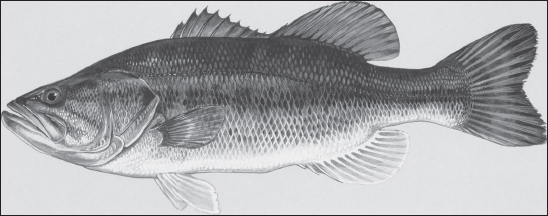
Largemouth Bass
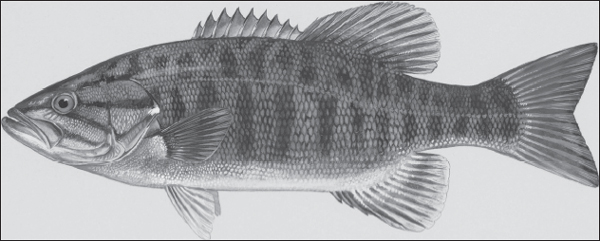
Smallmouth Bass
As with many species, largemouth bass grow bigger in southern states where warmer weather provides a longer growing season. In Florida, Georgia, Texas, southern California, Mexico and other southern climes, largemouths over 15 pounds are occasionally boated. On the other hand, in northern states and Canadian provinces, largemouths over 7 pounds are rare. The world-record largemouth bass was caught in south Georgia in 1932. It weighed 22 pounds 4 ounces.





